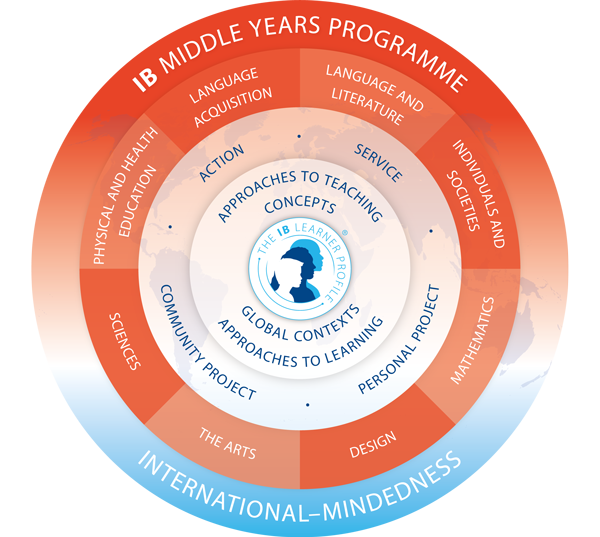Middle Years Programme

© International Baccalaureate Organization 2024
The International Baccalaureate® Middle Years Programme (MYP) emphasizes intellectual challenge through encouraging students aged 11 to 16 to make practical connections between their studies and the real world, preparing them for success in further study and life.
The programme empowers students to inquire into a wide range of issues and ideas of significance locally, nationally, and globally, fostering the development of young individuals who are creative, critical, and reflective thinkers. The MYP provides a rigorous and highly flexible framework that integrates with local educational requirements.
IB students are distinguished by practice-oriented attributes, developed throughout the learning process reflected in the IB Learner Profile. The learner profile is the IB’s mission in action. It requires IB learners to strive to become inquirers, knowledgeable, thinkers, communicators, principled, open-minded, caring, risk-takers, balanced and reflective. To learn more about the IB Learner Profile, please visit the following link
MYP Philosophy
The MYP is guided by three principles inspired by the IB mission: holistic learning, intercultural awareness and communication. IB philosophy is expressed through all aspects of the MYP. The MYP aims to help students develop their personal understanding, their emerging sense of self and responsibility in their community.
The IB Middle Years Programme:
The International Baccalaureate® Middle Years Programme provides a broad and balanced education for early adolescents. The programme promotes interdisciplinary study that helps students make important connections between academic subjects. IB programme models, including MYP, highlight important shared features of an IB education:
MYP curriculum is flexible, inquiry-based, and concept-driven. Integrated teaching and learning help students analyse complex issues and develop the habits of mind they need to participate in our increasingly interconnected world.
MYP focuses on STEAM as an important perspective from which to consider integrated teaching and learning in concepts and skills related to science, technology, engineering, arts and mathematics.
MYP is designed to facilitate interdisciplinary learning and teaching. In the Middle Years Programme, interdisciplinary learning supports students in understanding bodies of knowledge from two or more disciplines or subject groups, to integrate them and create new understanding.
Subject Groups
Middle Years Programme comprises eight subject groups including language acquisition, language and literature, individuals and societies, sciences, mathematics, arts, physical and health education, and design. The subject groups are connected through global contexts and key concepts.
Interdisciplinary Unit
Each year, students in the MYP also engage in at least one collaboratively planned interdisciplinary unit that involves at least two subject groups. Students demonstrate interdisciplinary understanding when they bring together concepts, methods, or forms of communication from two or more disciplines or established areas of expertise so that they can explain a phenomenon, solve a problem, create a product, or raise a new question in ways that would have been unlikely through a single discipline.
Personal Project
All students who complete the MYP in Year 5 complete the Personal Project. MYP projects are student-centred and age-appropriate, and they enable students to engage in practical explorations through a cycle of inquiry, action and reflection. MYP projects encourage students to reflect on their learning and the outcomes of their work – key skills that prepare them for success in further study, the workplace and the community. As students become involved in the self-initiated and self-directed learning process, they will find it easier to construct in-depth knowledge on their topic and develop an understanding of themselves as learners.
Service as Action
One of the core elements of the International Baccalaureate Middle Years Programme is Service as Action. ‘Action’ conveys the constructivist principles of learning by doing and experiencing. ‘Service’ requires that students are able to build authentic connections between what they learn in the classroom and what they encounter in the community.
The programme empowers students to inquire into a wide range of issues and ideas of significance locally, nationally, and globally, fostering the development of young individuals who are creative, critical, and reflective thinkers.
Reveal that:
Read more about the key findings from research on the impact of the IB Middle Years Programme
Personal Projects
MYP Projects are student-centred and age-appropriate, and they enable students to engage in practical explorations through a cycle of inquiry, action and reflection.
Service as Action
Service as Action is one of the core elements of the International Baccalaureate Middle Years Programme. Through Service as Action, students become “actors” in the “real world” beyond school.
Interdisciplinary Projects
Students demonstrate Interdisciplinary understanding when they bring together concepts, methods, or forms of communication from two or more disciplines or established areas of expertise so that they can explain a phenomenon, solve a problem, create a product, or raise a new question in ways that would have been unlikely through a single discipline.

